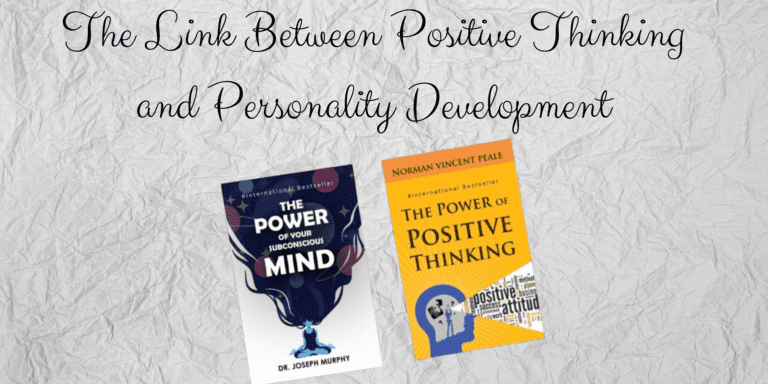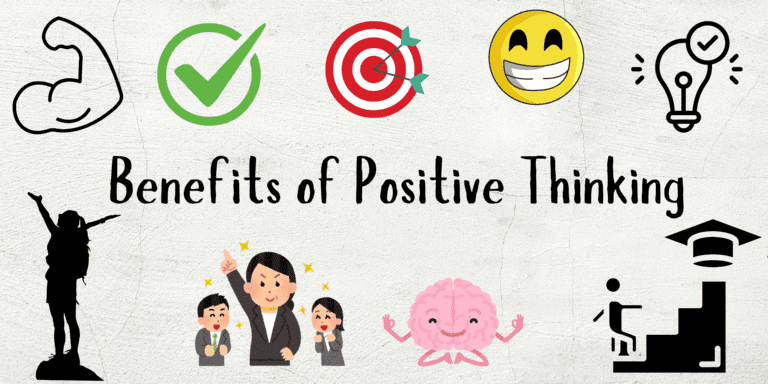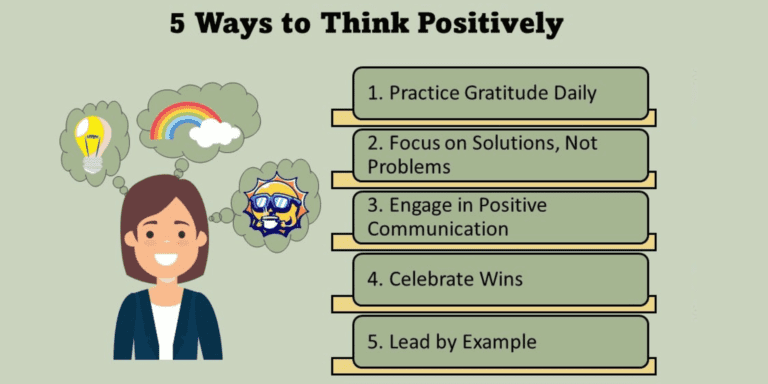How Positive Thinking Shapes Your Personality

Have you ever noticed how some people radiate confidence, face challenges effortlessly, and inspire their surroundings? The secret usually lies in their mindset. Power of Positive thinking is an effective mold for personality. it develops resilience and nourishes personal advancement. Positive thinking goes beyond seeing the glass as half full. it trains the mind to see possibilities, learn from failures, and create a winning mindset.
Our thoughts determine our emotions, decisions and relationships. With a positive mindset, we become more confident, open and solution oriented. Instead of fearing failure, we now embrace it as a path toward success. This perspective further sharpens our focus on overcoming obstacles, enhances emotional intelligence and builds the personality.
Thanks to the edge provided by being positive, the interpersonal relations develop and, lastly, create avenues for success in one’s professional life. The people who are truly positive are warm-hearted and confident and excel in the role of leaders and motivators. They also express themselves very well. They cope with conflict in a mature manner and leave an everlasting impression on others.
This blog will try to bring an understanding of how to think positively and help shape an individual personality, keep mentally healthy and lead a happy life. Are you ready to use your potential and walk your own path of positive thought? Let’s understand Power of Positive Thinking.
1. Understanding Positive Thinking
Table of Contents
Toggle
• What is positive thinking?
Positive thinking is an attitude of mind and emotion toward life, which dwells more on positivity, opportunities, and solutions, rather than negativity, fear, and limitations. This does not mean that you do not really acknowledge the presence of challenges or seriously pretend that problems do not exist; it means that you approach a challenge with a growth mindset, learning, and resilience.
In all cases, positive thinking is an attempt to shift the mindset from problem-watching to solution-seeking. Who will? You’re reinforcing self-beliefs about their abilities, maintain hope in adversities, and develop positive expectations for eventual success in their personal and professional lives.
Positive thinking can be characterized by:
– Optimism: Seeing goodness in people and in situations.
– Self-Belief: Trusting in your abilities and potential.
– Resilience: Bouncing back from failures while maintaining firm determination.
– Gratitude: Acknowledging good things in life, for both small and big, even during all difficult times. – Solution-Oriented Thinking: Concentrating on solving problems rather than concentrating on the problems.
Research has proven that positive thinking is immensely beneficial to mental health, reducing stress, and increasing general happiness. It also shapes personality traits such as self-esteem, emotional intelligence, and a positive attitude toward the challenges that life throws at them. While focusing on positive thoughts, one releases hidden creative potential and enriches life beautifully.
• Common Misconceptions About Positive Thinking.
Positive thinking is a considerable force aiding life transformations. However, it has several myths surrounding it and these misconceptions have had a way of making most people discount its effectiveness or practice it unrealistically. Some common myths about positive thinking and the facts behind them are given below:
1. Positive Thinking Means Ignoring Problems
One of the most important farces is that positive thinking is ignoring problems or pretending they don’t exist. If anything, true positivity involves appreciating the presence of challenges while actively seeking solutions. Seeing obstacles as opportunities for growth rather than denying their existence is the true nature of positivity.
2. Positive Thinking is Just Wishful Thinking
People assume that positive thinking means just hoping something good will happen without any effort. In reality, positive thinking must always be coupled with some sort of action, effort, and planning. It is about increasing one’s motivation to turn dreams into reality through action.
3. Being Positive Means Always Being Happy
A major assumption people tend to make is that a positive-minded person is happy all of the time. The truth is that even the most positive individuals have sadness, frustration, and disappointment to deal with. They just don’t allow the negative feelings to define them, find constructive ways of dealing with these feelings, and move on toward where they need to be.
4. Positive Thinking is About Avoiding Negative Thoughts
Some suppose that a positive mind never entertains negative thoughts. In fact, everyone goes through phases of doubt and fear. To think positively means not necessarily getting rid of negativity, but learning how to keep it in its place and reframing challenges.
• The science behind a positive mindset (psychological and neurological aspects)
Having a positive attitude is not only a feel-good philosophy, but it is based solidly on psychology and neuroscience. Research has demonstrated that the way we think affects our brain’s functioning, mood, and health. Here is how psychology and neuroscience illustrate the power of positive thinking.
1. Neuroplasticity
Neuroplasticity refers to the property of the brain that allows for the modifications of structure and function in response to activity or environmental changes throughout life. During positive thinking, neural pathways associated with the concepts of optimism, resilience, and problem-solving are strengthened. The pathways, being reinforced over and over again, train the mind to seek positive pathways by default. Eventually, optimism for this person becomes a habit, not a choice.
2. The Effects of Positive Thinking on the Brain
Scientific research has established that positive thoughts immediately activate the prefrontal cortex, which is involved with decision-making, emotional regulation, and goal-setting. Optimism energizes the release of neurotransmitters such as:
Dopamine. This “feel-good” hormone promotes motivation, focus, and happiness.
Serotonin. Serotonin is known primarily for its role in regulating mood, while also participating in stress reduction and the stabilization of emotional state.
Endorphins. They are excellent natural analgesics and mood enhancers, helping to create a sense of well-being. A positive attitude promotes the release of these chemicals, helping to reduce stress, clear the mind, and enhance emotional resilience.
3. Effect on Cortisol
Negative thoughts contribute to the production of cortisol, which is a stress hormone responsible for increasing anxiety, reducing immunity, and counteracting cognition. Positive thoughts do the opposite: they reduce cortisol and stimulate the parasympathetic nervous system, allowing the body to relax, rest, and recover.
The Link Between Positive Thinking and Personality Development

• How Thoughts Shape Behavior and Habits
The Power of Those Thoughts
Our thoughts give birth to behavior. What we think goes on to influence how we act, react, and engage with others. Certainly, when the focus is on positive thoughts, they tend to lead toward behavioral manifestations of confidence and proactive movement. On the other hand, negative thoughts erect barriers by attracting lack of confidence, indecision, and hasty decision-making.
Forming Mikey Roles Through Repetition
Thoughts churning around in the conscious mind surely become habits after repetition. Positive and empowering thoughts will engage good habits of discipline, persistence, and goal-setting. In contrast, negative or limiting thoughts are sources of distractions like procrastinating or avoiding, so they act to aggravate unhelpful patterns over time.
Changing Your Thoughts to Change Your Behaviors
When we willfully change our thoughts, we can thus change our habits. Thus, positive, growth-minded thoughts are supported by positive behavioral changes toward healthier outcomes that are functional for our goals and values that’s Power of Positive Thinking.
• The impact of positivity on self-confidence and self-esteem.
The Impact of Positivity on Self-Confidence
Positivity boosts self-confidence by reinforcing a belief in one’s abilities. When we maintain an optimistic outlook, we’re more likely to take on challenges, try new things, and trust our skills. This proactive mindset fosters growth and success, which further builds confidence over time.
The Role of Positivity in Self-Esteem
A positive attitude enhances self-esteem by encouraging self-acceptance. Embracing strengths and acknowledging weaknesses without judgment helps cultivate a healthy self-image. By focusing on what we can control and celebrating progress, positivity allows us to appreciate our worth, leading to greater self-respect and a more resilient sense of self.
• Role of optimism in decision-making and problem-solving.
Optimism in Decision-Making
Optimism is the other supporting pillar that promotes a positive attitude when expected outcomes are considered. Optimists would look for opportunities rather than obstacles, thus giving themselves confidence and hope to arrive at decisions. This distracts them from the fear of failure and paves the way to take calculated risks.
Optimism in Problem-Solving
Optimism assists resilience and creativity in problem-solving. With the negative tide of adversities against him, an optimist sees obstacles as temporary and ultimately surmountable. Instead of chasing the problems, optimism urges the creation of solutions, thereby honing the ability of such individuals to think, brainstorm alternatives, and persist until a workable solution emerges from among the contenders.
3. Benefits of Positive Thinking in Personality Growth

• Enhances emotional resilience
Positivity plays a major role in developing emotional strength, whereby a person is likely to tackle problems in a firm and adaptable way. Optimistic people consider defeat as transitory: they spend their energy seeking a solution rather than letting it get them worked up.This equips them to handle their stress better and enhance their perseverance for maximum recovery from failure or disappointment.
With those skills, they become emotionally balanced and strong from within. These powers position them in adversity while still maintaining an optimistic attitude. Simply put, emotional resilience is a gateway to mental well-being, social connectedness, and personal development and growth.
• Boosts motivation and productivity
Motivation and Positivity Work as Partners
Motivation gets a boost from a favorable perspective that casts aside doubt and temper, focusing instead on possibilities. When people focus on possibilities instead of obstacles, they become all the more motivated to attain objectives. Optimism mitigates self-doubt and fear of failure, allowing for sustained effort and perseverance.
Positivity and Productivity
Everything that nourishes motivation serves to improve the productivity of that person, which includes focus, energy, and efficiency. Positive-minded people gain energy with optimistic anticipation for their forward movement through each task, which takes care of effective time management and problem-solving. As long as they remain positive, people are sustained, overcome adversities, and achieve more in their careers and personal life.
• Strengthens relationships and social skills
The Role of Positivity in Relationships
There is a special kindness, empathy and communication that come with positivity in relationships. People with a positive outlook tend to be more approachable and understanding, which creates trust and deeper connections with others.
How Positivity Improves Social Skills
Confidence in social interactions is promoted by optimism; hence, social skills are enhanced. Conflict management, clear self-expression, and making the other party comfortable are better performed by such individuals. This attitude assists with networking, teamwork, and developing lifelong ties, resulting in a much stronger personal-professional relationship. Being positive makes the entire social interaction a lot of fun and rewarding.
• Reduces stress and improves mental well-being
Positivity Reduces Stress
Redirecting your attention away from the problem toward a solution allows a positive frame of mind to limit stress and anxiety. It is a mindset that takes everything somewhat lightly, wherein challenge is designated as an act that the player can rise up to, and failure is merely a setback, rather than dwelling with it in despair. This mind frame lowers cortisol, the stress hormone, allowing relaxation and balance of the mind.
Optimism Gains Mental Well-Being
Optimism promotes mental well-being in self-confident, hopeful, and emotionally stable individuals. They practice self-care, maintain relationships, and seek avenues of happiness. With time, such individuals build emotional resilience, promoting a life of health and fulfillment.
4. Practical Ways to Develop Positive Thinking

• Practicing gratitude and mindfulness
The Power of Gratitude
Nothing speaks to a grateful gnostic of one’s abundance; it rather puts a somewhat good spin on the wishy-washy present. Keeping our spirits high by remembering small pleasures, successes, and the kindness of others improves emotional health, lowers stress, and hammers resilience. It imparts joyful feelings and a nagging sense of adequate well-being in the routine schemes of life.
Mindfulness for a Balanced Life
Mindfulness is simply being in the moment-free from overthinking or anxiety. By staying present with no judgmental proclivities, there is heightened self-awareness in respect to both feeling and reaction to the feeling. With practices such as meditation, deep breathing, or mindful practices, one is better able to focus on the present while reducing stress levels, enhancing clarity of thought, and finding that much-needed inner calm.
• Surrounding oneself with positive influences
Positive People Impact
Power of Positive Thinking, People who are optimistic and supportive can motivate you, boost your confidence. And help you adopt a growth mindset. Positive influences are uplifting and inspiring to help people pull through challenging situations and keep a positive attitude. They inspire change in oneself and provide reinforcement for positive behaviors.
Creating a Positive Environment
A positive environment consists of positive talks, inspirational reading materials, and good activities that foster health and well-being. On the other hand, negativity, toxic relationships, and bad influences should be avoided in order to create a healthy emotional balance. When one surrounds oneself with positive influences such as mentors, friends, and role models, happiness, resilience, and personal growth will follow. This will lead one toward a more meaningful and successful life which shows Power of Positive Thinking.
• Reframing negative thoughts into constructive perspectives
Understanding Negative Thoughts
Negative thinking generates self-doubt, fear, and stress and these hinder personal growth and enjoyment. The negative attitude occurs from past experiences of failure, present-day fear of failure, and outside influences on self-confidence and decision-making.
Transforming Negativity onto Growth
Negative thoughts can be constructive thoughts if we work toward changing them consciously. Instead of “I can’t do this” think “I will learn and improve”. This presents setbacks as opportunities for learning that promote growth and motivation. Negative thoughts can be replaced with positive ones through self awareness, affirmation and focusing on finding solutions. The benefits of this increased cognitive flexibility are greater emotional health and the ability to be more successful.
• Setting realistic goals and celebrating small achievements
Importance of Realistic Goals
Power of Positive Thinking is Setting achievable goals provides an avenue for action and motivation. When a goal is specific, measurable and realistic, it is almost guaranteed to be accomplished, which greatly reduces frustration and self doubt. Breaking large goals into smaller steps allows for continual progress and motivation.
Celebrating winsNo matter how small, instills confidence and propagates healthy habits. Every achievement is a brick in the wall for a greater achievement. It is rewarding, motivates the doer, instills self-belief, and makes the journey worthwhile to celebrate successes. Small victories keep individuals motivated, build momentum, and foster a Power of Positive Thinking toward success.
5. Real-Life Examples of Positive Thinking Transforming Lives

• Share inspiring stories of famous personalities who succeeded through positivity
Oprah Winfrey: The Optimist Overcoming All Struggles
Born in poverty, as Oprah faced many hardships, she never lost hope. The positivity nurture determination that made her into a global icon in media and philanthropy.
Elon Musk: Failure Is Simply an Opportunity
Elon Musk keeps on believing things can work out. Hence, he kept going with Tesla, SpaceX, and other ventures in the face of opposition. That gutsy resilience of innovation towards turning the odds was the hallmark of his successful journey.
J.K.Rowling: Rejection to Best-selling
With almost nothing to eat, Rowling faced rejection after rejection, yet her unwavering optimism forced her to create *Harry Potter*, making her one of the most successful authors in history.
• Discuss personal anecdotes or case studies
Personal Growth Experiences
Power of Positive Thinking, Many people have been able to change their lives with a positive attitude. For instance, a young entrepreneur once battling self doubt now owns a thriving business with optimistic thinking, persistence and a willingness to learn from the failure.
A Case Study in Positivity Conquering Trials
In another study on athletes, those who engaged in positive self talk and visualization showed marked improvement over their peers dwelling in doubt. Altered mindset led to overcoming hurdles, performance improvement and reward.
Those real life experiences testify to the fact that positivity increases resilience, improves problem-solving ability and opens the way to personal and professional development.
Your mindset determines your reality. Choose positivity, embrace growth, and unlock the best version of yourself!
Start today—take the first step toward transforming your life with a positive mindset!
Conclusion
The core foundation of holistic personality development is the inculcation of a positive mindset, which manifests significantly on confidence, communication, relations, and general well-being. An individual can foster resilience and personal growth if he focuses on his strengths rather than weaknesses and treats challenges as opportunities. An optimistic attitude leads to self belief, motivation and proactiveness, which are key to attaining success in personal and professional life.A positive disposition nurtures emotional intelligence, facilitating better stress management and healthy interactions. Some small habits—such as developing gratitude, reframing negative thoughts, and hanging around positive people—can contribute immensely toward building a house on a foundation of continual optimism.
At last Power of Positive Thinking, Positivity does not mean looking away from the issue at hand but instead coming up with potential solutions. Little tweaks made in everyday thoughts and actions may entail transformation over the long term. When one chooses to keep a positive mindset, he liberates his potential and turns into a worthy person capable of building sound relationships and living a life full of purpose. Start today! Here and now: Be positive, and see how this transforms your personality!
